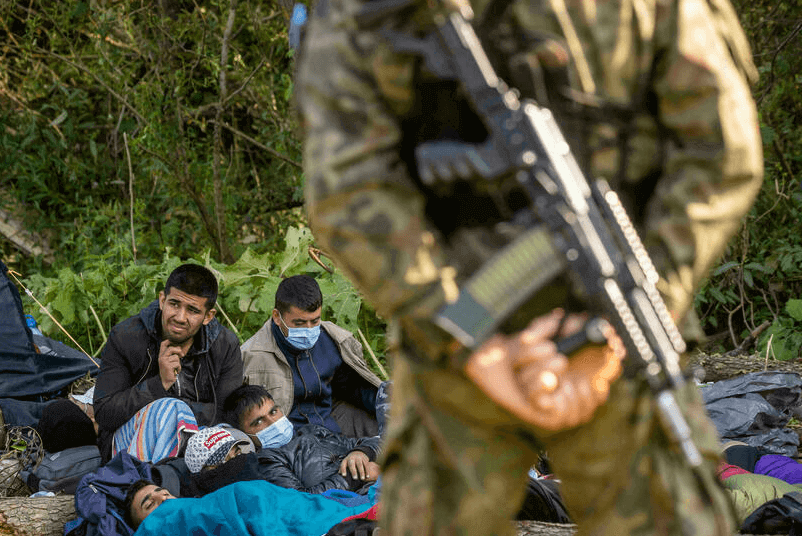On Monday, the International Organization for Migration (IOM), expressed concern about the “dire conditions” of migrants at the Poland-Belarus border.
“The migrants are facing extremely harsh conditions, with limited access to drinking water and food, medical assistance, sanitation facilities and shelter and prolonging this unacceptable situation poses a grievous threat to the migrants’ lives and health,” the United Nations’ (UN) migration agency said.
Last week, Polish President Andrzej Duda introduced a state of emergency on a strip containing 183 towns along the Poland-Belarus border. The published decree, also signed by Prime Minister Mateusz Morawiecki, enforced restrictions on the freedoms and rights of all Belarusian migrants present at the border. The state of emergency largely restricts the movement of migrants, except for medical or rescue purposes conducted by Polish officials only.
“In the areas covered by the state of emergency, the possibility to organise public gatherings, mass events, artistic and entertainment events has been suspended. Access to information on activities carried out in the area under a state of emergency related to the protection of the state border and the prevention and counteraction of illegal migration has also been restricted,” an article published by The Warsaw Times read.
Unable to move on either side, the state of emergency has left a large group of migrants stranded at the border. The Associated Press mentioned that 32 migrants are stuck in “no man’s land,” sleeping in tents for more than three weeks. “Food, water, and other supplies are regularly brought to them via Belarusian guards. The UN refugee agency and the Belarusian Red Cross also delivered supplies on September 2,” the news agency stated.
Furthermore, media coverage of the Belarusian border depicts an equally grim situation. Reports suggest that barbed wire is used to enclose the border, and that scores of soldiers stand above migrants “deprived of humanitarian aid.”
In light of these occurrences, the IOM urged Poland to work towards the betterment of the migrants. However, Poland upheld its decision, asserting that a state of emergency was imperative to protect itself against Russian military-backed Belarusian advancements. Additionally, Poland’s Deputy Interior Minister, Blazej Pobozy, claimed that a “false narrative” was being promoted in viewing the migrants at the border as “poor, hungry refugees who do not get help from anywhere.”
Moreover, Prime Minister Morawiecki cited Belarus’s attempt to “transport people, mainly from Iraq, to the Belarussian territory and push them into the territory of Poland” as the primary reason for the decision.
Like other European nations, Poland believes that Belarus is attempting to “seek revenge” for the European Union’s (EU) sanctions on President Alexander Lukashenko’s regime. To “destabilise the EU,” Belarus is actively encouraging migrants and asylum seekers from Iraq and even Afghanistan, hoping to reach Europe to come to Belarus, creating traffic and chaos at the shared Polish border.
Earlier, German Chancellor Angela Merkel also referred to Belarus’ action at the Polish border as “using people, refugees or people from other countries who are in distress, as a hybrid weapon” to engender a migration crisis to unsettle the EU.
Meanwhile, Belarusian Foreign Minister Vladimir Makei has sharply rejected the claims made by Poland and Germany. “They’re saying nowadays that Belarus unleashed a hybrid war on the European Union. It’s ridiculous to hear. Belarus, of 10 million (population), unleashed a hybrid war on the 500-million European Union,” he said.
As of now, it is uncertain whether Poland will repeal the state of emergency after criticisms from the UN and others who have accused the government of “inhumane” behaviour towards the migrants.
UN Expresses Concern Over Migrants’ “Dire Condition” at Poland-Belarus Border
The UN expressed its deep concern over migrants’ prolonged suffering at the Poland-Belarus border. Poland, however, decided to uphold its state of emergency along the border on Monday.
September 7, 2021

Migrants remain stuck at the Poland-Belarus border. SOURCE: WOJTEK RADWANSKI/AFP
